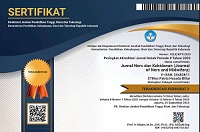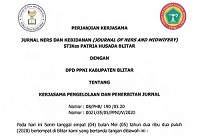Parents Perception About Adjusment Disorder At First Day School In Permata Iman 3 Kindergarten
DOI:
https://doi.org/10.26699/jnk.v7i1.ART.p006-010Keywords:
Adjusment Disorder, Kindergarten ChildrenAbstract
Kindergarten is one form of early childhood education services for children aged 3-6 years which serves to lay the foundations towards the development of attitudes, knowledge, and skills. Therefore, self-adjustment is one of the important things in determining the success of a child in meeting the demands of the surrounding environment. This study aims to Identify Parents Perceptions of Adjusment Disorder At First Day School in PermataIman 3 Kindergarten Malang. The design in this study is descriptive. The population and sample in this study were all children aged 3-6 years who had just entered school as many as 84. The sampling technique used is total sampling. The instrument used in this study was the Child Behavior Checklist for Ages 1.5-5. This research was conducted at PermataIman 3 kindergarten in July 2019. Data obtained will be analyzed univariate and presented in percentage form. The results showed that adjustments to disorder at first day school in children in the mild category amounted to 66 (78.6%) and a small portion in the moderate category amounted to 18 (21.4%). This is probably due to factors of age, physiological conditions, order of children, and parenting. Based on the results of the study parents should be able to choose the right time to include children in the pre-school environment, namely at the age of > 4-5 years. And it is very important for the school to pay attention to the school environment, especially in the readiness of facilities, facilities and the environment.
References
Achenbagh & Rescola. (2000). Child Behavior Checklist for Ages 1.5-5 years.ASEBA, University of Vermont, Burlington: Amerika Serikat.
Cahyaningsih, Dwi S. (2010). Pertumbuhan Dan Perkembangan Anak. CV Trans Info Media:Jakarta.
Dewi, Rizki C., Oktiawati, Annisa, &Saputri,Lintang. (2015). Teori Dan Konsep Tumbuh Kembang Bayi, Toddler Dan Usia Remaja. Nuha Medika:Yogyakarta.
Kusdiyanti, S; Halimah, Lilim: &Faisaluddin. (2011). PENYESUAIAN DIRI DI LINGKUNGAN SEKOLAH. Jurnal Humanitas Vol. VIII. No.2 Agustus.
Malik, Halim. 2011. Pendidikan Non Formal dan Peranannya Dalam Pendidikan Anak Usia Dini. Http: //edukasi.kompsiana.com/2011/04/07/pendidikan-non-formal-dan-peranannya-dalam-pendidikan-anak-usia-dini/ .
Mareta, Reni; Masithoh, Robiul Fitri. (2017). Hubungan Antara Sibling Rivalry Dengan Kemampuan Penyesuaian Social Anak Usia Prasekolah Di TK Ulil Albab Mertoyudan. The 6 th University Research Colloquium. Universitas Muhamadiyah Magelang.
Putri, Ayu Citra Triana.(2013). Skripsi: Dampak sibling rivalry pada anak usia dini. Jurusan Psikologi Fakultas Ilmu Pendidikan Universitas Negeri Semarang.
Susanti, Ani; Widuri, Erlina L.(2013). PENYESUAIAN DIRI PADA TAMANK ANAK-KANAK. Jurnal Empathy FakultasPsikologi Vol.(1) No.1
Yusman, Elza. (2009). Skripsi: Hubungan Pola Asuh Orangtua dengan Prestasi Belajar Anak SDN 05 Siang, Meruya Selatan Jakarta Barat. Universitas Esa Unggul: Jakarta.
Downloads
Additional Files
Published
How to Cite
Issue
Section
License
Copyright (c) 2020 Jurnal Ners dan Kebidanan (Journal of Ners and Midwifery)

This work is licensed under a Creative Commons Attribution-ShareAlike 4.0 International License.






